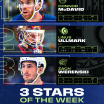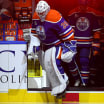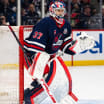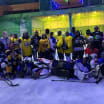Five co-workers are sitting around a table at a Scottsdale, Arizona, restaurant. They are talking about their new jobs, their future and whatever else young people talk about. Three of them are teenagers. None has a home in the area and only one has a car; the other four share two cars.
It is all going well, and then the bill comes.
Now what?
Coyotes bet big on rookies for future success
Infusion of youthful talent vision of 27-year-old John Chayka, NHL's youngest-ever general manager
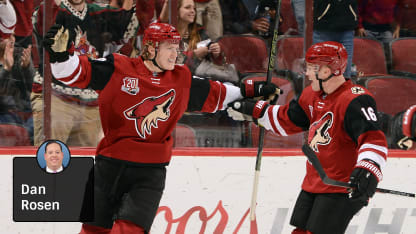
There's no looking around for mom or dad. The five -- Lawson Crouse, 19, Jakob Chychrun, 18, Dylan Strome, 19, Christian Dvorak 20, and Laurent Dauphin, 21 -- are professional hockey players, each in his rookie season with the Arizona Coyotes. Even if they're all living in a hotel and carpooling wherever they go, they are adults playing in the NHL. They're making money now and someone has to pay the bill.
To decide who, they play a game, of course.
"Credit card roulette," Crouse said.
It's a simple gamble: All five put their respective credit card into a hat and the last card that gets pulled out is used to pay the whole bill. It's 5-1 odds, except Chychrun somehow keeps beating them.
"He's riding a big tidal wave right now," Crouse said. "He hasn't hit it in a long time."
The Coyotes are hoping to hit it big with these rookies and a few more young players. With Chychrun and the other four rookies on the roster to start the season, they are banking on a big payoff in the future.
Toss in 21-year-old second-year forwards Max Domi and Anthony Duclair and Arizona has seven players 21-or-younger, the most of any team in the NHL this season, all on entry-level contracts.
The youth movement has created a vision for the Coyotes and a reason to believe there may finally be hope for a bright future in the desert.
"We're still trying to find that core group of players that gives us a run here for a long time as a championship-caliber team," said first-year general manager John Chayka, who at 27 is the youngest GM in NHL history. "The best way to do that is just play the odds. You get a group of great young players and see who can be on that team, be that core player."
Chayka may sound like a gambler, but everything he and coach Dave Tippett are doing, backed by supportive ownership, is by design and fueled by knowledge, numbers, salary cap space and belief.
Chayka and Tippett record details of their games, from zone entries to dump-ins to shot attempts for and shot attempts against. They are minutia to some, but powerful information to them. Each could have 30 pages or more of postgame notes to share and analyze.
They monitor every practice to see who is working the hardest, who is processing the information, who is doing the right things to prove he's a pro.
The rookie infusion didn't happen by chance. Chayka used cap space as an asset this past summer to make it happen.
He took on Pavel Datsyuk's $7.5 million cap charge from the Detroit Red Wings in order to move up to No. 16 in the 2016 NHL Draft, a pick he used to select Chychrun. He acquired Dave Bolland's $5.5 cap charge for the next three seasons in a trade with the Florida Panthers, but also got Crouse in the trade.
Datsyuk and Bolland will never play for the Coyotes. Chychrun and Crouse could be fixtures of future championship teams.
"It's all dependent on these guys. They're the ones who determine their rate and their fate," Chayka said, referring to all of his young players. "We've got the group that together is going to have to grow and they're going to have to learn."
Who are they?
Most of the young coyotes have known each other and played against each other for a long time, but this is different. They are teammates and in a matter of months have become close friends. They spend all of their time together, at home and on the road, going out to dinner and hanging out in the hotel on off days and between practices and games. They have gotten to know each other well.
Ask Dauphin and he'll tell you that Dvorak is the serious one in the group.
"Always serious," he said. "Doesn't talk."
Dvorak, who did talk for this story, agrees, with a caveat.
"He's pretty serious too," he said of Dauphin in a quiet, monotone voice. "I'll give it right back to him."
He can try, but the consensus is that Dvorak is Mr. Serious. He always has been that way, according to Domi, who played with Dvorak on the London Knights of the Ontario Hockey League from 2013-15.
"Once you get to know him he'll talk as much as you want him to, but before that he's pretty to himself, quiet," Domi said. "It's hilarious because he's actually so talkative once you get past that, but at the start he's like two different people. It's so funny just to watch when he first meets someone how he acts around them. But he's so honest and he's such a good guy, and he's an unbelievable hockey player too."
How about the clown of the group?
"I'd probably say Stromer," Dvorak said. "He's more the jokester. He tries to make a lot of jokes so we always have a good time."
"Stromer is probably the most talkative, probably the one getting the most laughs out of us," Chychrun added.
Dauphin and Domi gave a nod to Strome, but gave the award to Duclair.
"It's just the way he talks," Dauphin said of Duclair. "And he always laughs. Just his laugh makes me laugh."
Strome is known for something else too.
"If you ask Dylan Strome any question about anything to do with hockey he can answer it," Domi said. "He's like a walking encyclopedia."
That may get a few laughs from his buddies, but it has drawn the respect of the veterans on the team, including 40-year-old captain Shane Doan.
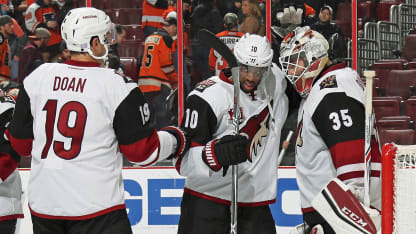
"He's a hockey nerd, which I love," Doan said. "He studies the game, knows the history of the game. If you're talking to him he's going to want to talk about hockey. He'll want to talk about the World Juniors, but not the World Juniors he played in. He'll talk about the guy who played for the [Maple] Leafs, the Red Wings. He just loves hockey."
They may have opposite personalities, but Strome and Dvorak have at least one thing in common: they are locked in a heated competition to one-up each other in Super Stickman Golf 3, a game they play on their phones.
"It's honestly all they talk about," Chychrun said. "It's unbelievable how much they play this game. Devo is unbelievable at it. They play it all day long, so they have a huge competition with that. It basically runs their whole day."
It's not like they don't the time. Other than practice on an off day or preparing for a game, the rookies are experiencing hotel living. Of the 11 games they have played this season, seven have been on the road, including a six-game swing through Ottawa, Montreal, New York and Philadelphia in the first week of the season.
"We try to keep it loose," Crouse said. "Hockey can be very stressful, so whether it's just hanging around the hotel, chilling by the pool, whatever we're doing we're trying to kick back and just enjoy the life of a hockey player outside the rink."
This is their new normal now, and they wouldn't want it any other way at this stage of their careers.
"For the most part all the veterans have been great to us young guys, but having these young guys here makes it easier to adapt and adjust into this league," Crouse said. "You look around, having five rookies right now, you're not the only one thinking, 'Hey, am I going to step on anyone's toes doing this?' A lot of the stuff we do we do together. It makes it more comfortable for all of us."
Not too comfortable, though. Tippett won't allow that.
"Young players, first of all they're kind of in awe that they're in the NHL, so you've got to get by that part of it," he said. "Then it's, 'OK, you're in the NHL now, you've got to do the job.' There is a responsibility to doing the job, not just being in the NHL."
How's it going so far?
Success in the NHL is measured in wins and losses, but Chayka and Tippett have a longer view in mind for their young players.
"We're looking for progress and improvement and the way they're trending," Chayka said. "It's always about alternatives in this industry, right? It's nice to say the veteran player comes in and the first 5-10 games he's the better player, but you have to play 82. We want to see these players get better and we want to be a better team at the end of the year than we were at the beginning. We want to get better and improve as a team over the course of the season. As long as these players are showing that that's what we're looking for in terms of their evaluation process."
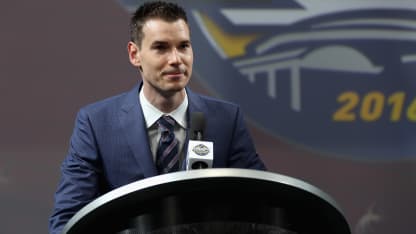
© Dave Sandford/Getty Images
That's why even though the Coyotes went 1-5-0 on their season-long six-game trip, Chayka and Tippett weren't ripping up the plan or canceling the experiment.
Tippett said he saw improvement from the first game of the road trip (a 7-4 loss at the Ottawa Senators) to the last game (a 5-4 win at the Philadelphia Flyers). The Coyotes had back-to-back one-goal losses and a third game that would have been if not for an empty-net goal before they won in Philadelphia.
The Coyotes are 2-2 since beating the Flyers, including a 5-1 defeat at Anaheim on Friday that has them at 4-7-0 entering their game next game Tuesday at Colorado.
"I think the young guys are doing a really good job," said 25-year-old defenseman Oliver Ekman-Larsson, the potential next captain in Arizona. "They have big ears, they listen a lot and they try to do the right thing, but sometimes you've got to mess up and that's what you're going to learn from. That's what I learned from. I wasn't perfect when I got over here. I messed up, but then you get a feel for what to do different to be successful. They are smart enough players to know when they're doing something wrong and have to switch it up."
An example is understanding how much time they have on the ice.
"Your time is cut down so much in this league when the puck is on your stick and when you have to make decisions," Chychrun said. "All over the ice you have to be thinking so quickly, so sharply. You almost have to be thinking ahead most of the time and if you're not you'll find yourself in bad areas of the ice and not knowing what to do with the puck. That's definitely been the biggest thing.
"I'm able to keep up with the pace here, but I definitely notice the time you have is very slim and cut down a lot from junior."
They're learning how to handle being out of the lineup, some to a much greater degree than others.
They've all been scratched. Dauphin, Dvorak and Crouse have all played lower in the lineup. Chychrun has been on the third defense pair with Luke Schenn. Dvorak had been demoted, but was recalled Thursday.
Tippett said Strome, who has been scratched five times this season, is coming along the slowest of the five, but that is partly because as a center he's expected to be a playmaker and a scorer and has yet to earn a consistent spot on either of the Coyotes top two lines.
Still, Chayka sees progress.
"I think there is a bit of misconception about Dylan in the sense of we're not happy with his progress or we don't like what we've seen so far," Chayka said. "I'm extremely positive with the strides he's taking. They're not all on the ice right now in games, but off the ice and in practice he's gone from being a guy that quite frankly made it with skill his whole life and talent alone, now all of a sudden he's becoming one of the hardest working players. That's just a necessary component of being an NHL player."
Strome (five games), like Crouse, can be sent back to the OHL without burning a year on his entry-level contract before he plays 10 games. At this stage, though, it's unlikely he's leaving the Coyotes any time soon.
"I still feel strongly that having him on this team is important to us and important to his development," Chayka said. "What are his needs to get better? They're not to go back and put up another 120 points in junior. He's done that a couple times already. For now he's here and as long as he continues to get better and we think he adds value to the team he'll be here."
Domi and Duclair went through that process together last season, albeit without being scratched. They have become sounding boards and role models for the rookies as much as veterans like Ekman-Larsson and Doan are.
"It's hard to realize how hard this league really is," Domi said. "The first two months of the year you're running off this adrenaline rush, you're excited to be in the NHL, playing against these superstars. But as soon as that wears off it's like, 'Oh geez, this is hard.' You have to somehow find a way to elevate your game every single day."
What comes next?
If the rookies think it's hard to establish themselves, Domi and Duclair can tell them how difficult the NHL can be once you've gained a reputation. Each has struggled early in his second full NHL seasons.
"That second year is hard," Doan said. "You want to take a breath and say, 'OK, I've made it,' but the League doesn't let you take that breath."
Duclair has one goal and one assist this season; Domi has no goals and seven assists. Last season, they each played 81 games with Domi scoring 18 goals and 52 points and Duclair getting 20 goals and 44 points.
"Max and Duke, they jumped in and took off [last season], but now there is an expectation," Tippett said. "It's not just an expectation from our team, but every team we play. You can see the expectation, like they know who they are. There is a whole different element that goes with that."
Tippett said Domi has shown flashes of the game he had last season. His concern is that Duclair hasn't.
"Duclair had a real high shooting percentage last year [19 percent]," Tippett said. "But the concerning thing for me now is he hasn't gotten nearly as many chances as he got last year."
There is no secret to getting Duclair through it, Tippett said.
"Keep coaching him, a lot of video and a lot of talking to him, but ultimately they've got to get out there and do the job," he said. "It's a hard job to do. Duclair, he's a scorer. It's the hardest thing to do in the League."
His belief has not wavered.
"They've proven they can do it at this level," he said. "Sometimes you go through ruts like this, but you've got to put the work in."
Domi and Duclair are doing that. The difference is now they're doing it with less-experienced teammates watching them and trying to learn from them the way they learned from veterans last season.
"You look at a team like Chicago, like [Patrick] Kane and [Jonathan] Toews, I'm not saying we're Kane and Toews, not comparing us to them at all, but they started together and they built a core group together and look where they are now," Duclair said. "That's the mindset. There are tough times obviously, but that's the point of a rebuild. It takes time, takes patience, but we'll battle through it."
Can they get there?
Doan, who has been with the organization since it moved from Winnipeg to Phoenix 20 years ago, wants to believe that the future is in the room, that he'll leave the Coyotes in good hands whenever it is that he decides to retire.
"It's exciting, but you have to be incredibly careful as an organization not to let the idea of the future let you off the hook in the present because that's where you're habits are formed," Doan said. "With [Tippett], he's pretty accountable and holds guys accountable and is pretty aware of that stuff. That's going to be important. This could be a staple organization in the NHL, but you're going to have to be aware. There have been organizations that have had a lot of prospects and still have a lot of prospects if you know what I mean."
Doan is doing what's in his power to try to bring the young players along, encouraging them to improve their play away from the puck.
"That's so important for younger players to learn," said Doan, who admits he's struggled with it early this season. "It's funny because the sole focus of so much of young players, and I'm not talking young players as in just our team, I'm talking young players in general, is the skill. You watch them and they're amazing at stickhandling and shooting the puck, all those things, but you only have the puck on your stick for 30 seconds in a game. So you spend all this time working on the skill side of the game and they all have stickhandling coaches and skill coaches, and you realize you need to learn that play without the puck is so important. If you play 15 minutes, you don't have it on your stick for 14 and a half."
Doan, whose oldest daughter, Gracie, is 8 ½ months younger than Chychrun, tries to keep up with the young players when he can.
"Having [four] kids, I'm aware that I need to stay up to date on what's going on in their lives," Doan said. "It's not the same here, but it helps. The young guys do a good job of including me so that makes it a lot easier. I want to know what's going on in their lives."
Including him? Isn't it typically the other way around?
"Not when you're in the minority," Doan said, laughing. "I'm definitely in the minority by quite a ways. Even our guys who are older than 21, they're like 22, 23, 24 or 25."
"You couldn't find a better person to mentor these young guys," Chayka said.
Doan might not be around when the product is finished. He's OK with that as long as the process doesn't stall, rewind, or reboot altogether. He's seen that before. This time seems different to him.
The Coyotes have gone full bore into a new era, with a bright, young, analytical GM and a coach who has modernized himself to today's NHL giving a group of seven players 21 or younger the chance to earn their spot in the team's future core.
They don't see it as gambling; they see it as experimenting to come up with a winning formula that leads to a winning culture. Nobody knows yet if that's going to be possible, but there's no stopping the experiment now.
"It's on these guys now to figure it out, to work together and come up with a solution that works now and in the future," Chayka said. "This is a great group of young players that we think has a high, high ceiling, the potential to do great things. They'll learn together."

